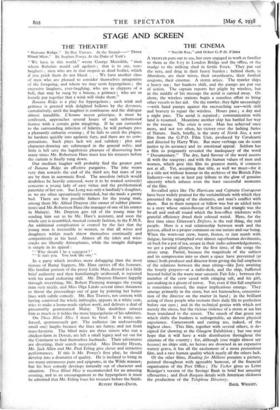STAGE AND SCREEN
THE THEATRE
"Banana Ridge." By Ben Travers. At the Strand—" Three Blind Mice." By Stephen Powys, At the Duke of York's
"WE have in this world," wrote George Meredith, "men whom Rabelais would call agelasts ; that is to say, non- laughers ; men who are in that respect as dead bodies, which if you prick them do not bleed. . . . We have another class of men who are pleased to consider themselves antagonists of the foregoing, and whom we may term hypergelasts ; the excessive laughers, ever-laughing, who are as clappers of a bell, that may be rung by a breeze, a grimace ; who are so loosely put together that a wink will shake them."
Banana Ridge is a play for hypergelasts ; each wink and grimace is greeted with delighted bellows by the devotees, cumulatively, until the laughter is continuous and the dialogue almost inaudible. L'homme moyen gelastique, it must be confessed, approaches several hours of such unbuttoned licence with a certain grim misgiving. If he can surrender to the surrounding infection of hilarity, he will perhaps pass a pleasantly cathartic evening ; if he fails to catch the plague, he hardens quickly into agelastic fury, and there are no com- pensations. Such plays lack wit and subtlety : plot and character-drawing are submerged in the general melee, and little is left save the lugubrious pleasure of discovering how many times Mr. Robertson Hare must lose his trousers- before the curtain is' finally rung down.
Our medium laugher will probably find the greater part of Banana Ridge an effective purgative. The joke wears very thin towards the end of the third act, but tears of joy are by then in automatic flood. The anecdote (which would doubtless be heavily censored, were it to be treated seriously) concerns a young lady of easy virtue and the problematical paternity of her son. Sue Long was only a landlady's daughter, as we are often uproariously reminded, but she made a pretty bed. There are five possible fathers for the young man, among them Mr. Alfred Drayton (the owner of rubber planta- tions) and Mr. Robertson Hare (the manager of one of his estates in Malaya). Mr. Drayton gets rid of the young man by sending him out to be Mr. Hare's assistant, and soon the whole cast is assembled, musical comedy fashion, in.the F.M.S. An additional complication is created by the fact that the young man is irresistible to women, so that all wives and daughters within reach throw themselves continually and competitively at his head. Almost all the joke's and wise- cracks are liberally Aristophanic, while the straight dialogue is simple in its appeal :
" ' Why should I be a scapegoat ? '
" It suits you. You look like one.'"
In a party which involves more debagging than the most riotous of Bump Suppers, Mr. Hare carries off the honours. His familiar portrait of the prosy Little Man, dressed in a little brief authority and then humiliatingly undressed, is repeated with his usual endearing skill'. Mr. Drayton blusters- happily through everything, Mr. Robert Flemyng manages the young man very nicely, and Miss Olga Lindo several times threatens to throw the proceedings out of gear by pointing her better lines with subtle comedy. Mr. Ben Travers, not content with having contrived the whole imbroglio, appears in a white colt, tries to make a home-made siphon work, and delivers a deal of presumably grammatical Malay. This doubtless amuses him as much as it tickles the more hypergelastic of his admirers.
On Three Blind Mice I must be brief. It is witty, forced, spontaneously gay. The audience (an undeservedly small one) laughs because the lines are funny, and not from mass-hysteria. The blind mice are three sisters who run a chicken-farm in Dorset, are left a small legacy and set out for the Continent to find themselves husbands. Their adventures are diverting, their search successful. Miss Dorothy Hyson, Mr. Jack Allen and Mr. Paul Erling give clever and attractive performances. If this N Mr. Powys's first play, he should develop into a dramatist of quality. He is inclined to bring in too many extraneous puns and epigrams, in the Wilde manner, but his best comedy develops naturally out of character and situation. Three Blind Mice is recommended for an amusing evening, and as an encouragement to the hypergelasts it must be admitted that Mr. Erling loses his trousers before the finish.
RUPERT HART-DAVIS.


































































 Previous page
Previous page